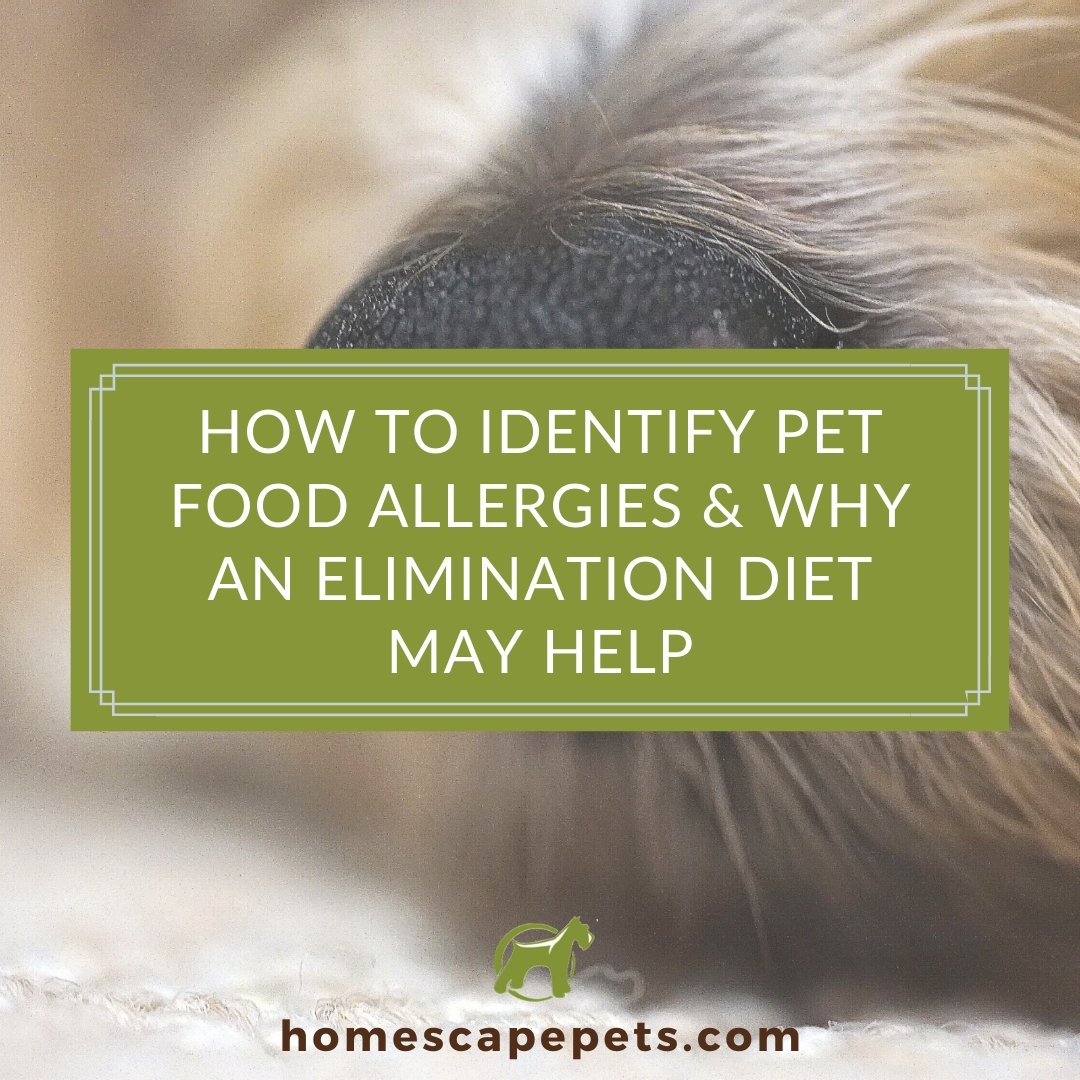
How to Identify Pet Food Allergies and Why an Elimination Diet May Help
Share
Watching your pet suffer from any condition can make pet parents feel helpless, especially when the cause is unknown. Unfortunately, one of the hardest conditions to identify (and one of the most common) is allergies, as there are countless factors to consider. Is the cause of your pet’s allergies environmental, seasonal, or does it have to do with food? How can you tell the difference, and what are the ways in which you can address these problems effectively?

As pet parents ourselves, we’ve had experience with uncertain diagnoses in the past. We spent years learning about the root causes of a variety of conditions in animals, including pet food allergies. Today we’re going to answer some of the questions you may have about your pet’s food allergies, and how an elimination diet may help.
Pet Food Allergies, and How to Identify Them
The most obvious sign of any kind of allergy in pets is persistent itching and chewing at his own skin. In fact, 70% of skin conditions in pets are related to allergies. Regardless of the cause, you should always take immediate action and consult your veterinarian if your pet is experiencing something more chronic than the occasional itch.
There are ways, however, to help determine whether his chronic itch is food-related. Pet food allergies usually manifest in other symptoms:
- Gastrointestinal issues (vomiting, diarrhea, chronic gas)
- Chronic ear infections or inflammation
- Non-seasonal itching (year-round)
- Lesions or hot spots all over your pet’s body rather than just one or two localized areas
- Overgrooming, particularly in cats
Please note: Prescribed steroids do not effectively address any of the above-mentioned reactions.
Another important thing to note is that at least 10-15% of dogs with allergies are truly allergic to their food, but many also can have food sensitivities (or an intolerance). Both exhibit similar symptoms, and as such, both are considered cutaneous adverse food reactions (or CAFR). In the case of true food allergies, your dog’s immune system is attacking food proteins, in which case you may want to talk to your veterinarian about trying an elimination diet.
What is an Elimination Diet, and is it Right For My Pet?
Surprisingly, the skin and blood tests that are performed to determine allergies only have a 60% rate of accuracy… and also tend to be incredibly expensive. That’s where elimination diets come in—they’re the only reliable way to determine true food allergies for pets.
Also known as a “restricted diet,” elimination diets consist of limited ingredient meals that will help you determine the cause of an allergic or hypersensitive reaction in your pup. You’ll also find foods that won’t harm your pet, which is a plus!
You can also think of it as a “food-elimination trial,” which is a little more self-explanatory. Your first step would be to think about everything you feed your pet, right down to treats and other things he might eat throughout the day aside from his regular diet. You’ll want to compose an exhaustive list of all the ingredients in these foods… it’s difficult, but do your best! Now you’ll have a list of the ingredients to narrow down as you choose foods for his elimination diet.
Which Pet Food Ingredients to Use
Common allergens for pets include beef and chicken, so that should be immediately off the table as you begin your pet’s elimination diet. Elimination diets typically consist of one protein source and one carbohydrate that has never before been included in your dog’s diet.
Your first goal should also be finding the ingredients your pet isn’t allergic to, which is why your vet will most likely recommend starting your pet on a diet of “novel” ingredients. This will also help determine that your pet isn’t allergic to these ingredients, to begin with. Here are some common novel ingredients used in elimination diets:
- Proteins
- Lamb
- Bison
- Venison
- Emu
- Goat
- Kangaroo
- Carbohydrates
- Oats
- Quinoa
- Chickpeas
- Pumpkin
- Barley
Ideally, your pet’s food allergy symptoms will clear up, but be patient. This can take weeks! Eventually, if your pet has stopped itching or exhibiting the other signs and symptoms listed above, you can introduce one more ingredient back into his diet. If his symptoms flare up again, you know to add that added ingredient to his list of forbidden foods. Remove that ingredient, wait for his symptoms to clear up again (completely!), and then try another ingredient.
Commercial Pet Food and Things To Watch Out For
Many commercial foods will claim to be great for elimination diets because they consist of novel proteins and carbs or having limited-ingredient formulas. If you are looking for specialty or commercial pet food and your pet should be on an elimination diet, always do a thorough scan of the ingredients. Oftentimes, these same brands will include chicken, which is actually a very common allergen for pets. Be sure there are no ingredients that your dog has had before.
You should also think about cross-contamination when it comes to pet-food manufacturing facilities. If your dog is severely allergic to beef, for instance, he may have a chance of reacting to a food claiming to contain no beef but was made with improperly cleaned equipment.
At the end of the day, a good rule of thumb is the fewer ingredients, the better. Even commercial diets that claim to have limited ingredients very often contain many more ingredients than a home-cooked or home-prepared diet would.
For these reasons and many others, Homescape Pets is passionate about limited ingredient foods, treats, and supplements. In fact, we apply that rule of thumb to everything. The simpler and purer the product, the healthier and happier the pet! That’s why our supplements are so great for pets who suffer from food sensitivities or allergies.
If your pet has to be on an elimination diet, our Calming Relief supplement may help provide soothing relief. It’s made from only 2 ingredients: Raw Unrefined Organic Hempseed Oil and Organic Turmeric, both of which help alleviate inflammatory responses and digestive issues in pets. A bonus? Our hempseed oil is a novel ingredient! Try it out today, and tag us @HomescapePets to let us know how it goes with your pet!
If you’re looking for some of our other blog posts on natural herbs, treats, and healthy treats to feed your pets, check these guys out:
- Healthy Benefits of Raw, Natural Chews for Cats & Dogs
- Healthy Pet Products we Love (& Think You Will, Too)
- 3 Easy and Inexpensive Ways to Improve Your Pets Diet
- Healthy Snacks for Your Pet That May Already be in The Fridge (& Some to Avoid)
- Get Rid of The Chemicals in Your Pet’s Food, Treats, and Supplements
- Natural Herbs that are Safe for Cats and Dogs
